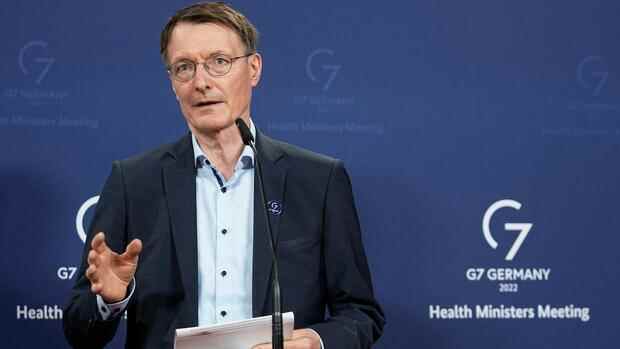Berlin While vaccination centers remain empty or even close, Health Minister Karl Lauterbach (SPD) is already planning the next vaccination campaign. On Thursday, for example, Berlin announced that it would only operate its vaccination centers in Tegel and the exhibition center until the end of June. At almost the same time, the health ministers of the G7 countries met in the capital’s Red City Hall to forge a global pandemic pact.
“We haven’t overcome the pandemic yet,” said Lauterbach. This is shown by a look at countries such as China and North Korea, which are currently severely affected. And in Germany, too, 130 to 150 people would still die every day because of the pandemic. The SPD politician explained that it is about training specialists to quickly assess the dangers of systems and waves of infection and to bring international experts together. In addition, it is also about vaccine development and storage. The aim is to react more effectively and quickly to outbreaks of infection.
Lauterbach has been preparing for a possible new corona wave in autumn for weeks. The third wave hit the country largely unprepared last year. This should not be repeated. The minister recently announced a pandemic plan that he intends to present in the coming days.
At the beginning of the week, the health ministers of the federal states also insisted on extensive powers for the autumn. A central component is also the new vaccination campaign with the aim of being able to offer everyone a fourth vaccination during the cold season.
Top jobs of the day
Find the best jobs now and
be notified by email.
A strategy adopted by the Federal Cabinet provides for a further 830 million euros to procure a preparation announced by the manufacturer Moderna, which should work in different variants at the same time. According to Lauterbach, due to contracts with the old government, there is sufficient vaccine that works against the original variant including the delta variant. A second vaccine from Biontech, purely adapted to the Omicron variant, has also been ordered.
Union criticizes further vaccine orders
In view of the existing quantities, criticism of further orders came from the opposition. Germany will be left with millions of unused cans because no donations are accepted internationally, said the Union’s health policy spokesman, Tino Sorge (CDU), the Handelsblatt.
He refers to an unpublished response to a request to Lauterbach’s ministry, according to which the international vaccine alliance Covax has long stopped accepting donations. In addition, the federal government has no information about the expiry dates of the stored vaccines. “Continuing to shop without having an overview of expiring cans would be the completely wrong approach,” criticized Sorge.
Lauterbach, on the other hand, defended the plans. One lesson learned from the pandemic is never to run out of vaccine again, the minister said. In order to be able to vaccinate as quickly as possible, the vaccination centers should also be continued and supported by the federal government with up to 100 million euros per month.
However, Berlin’s decision to close vaccination centers shows that not all countries are going along with it. There they want to offer the vaccinations in the future, especially through the doctor’s offices. It was said in a statement that the vaccination campaign was to be geared more closely to needs and demand.
They are not only low in Berlin, but throughout Germany. On average, only 46,000 people receive a vaccination per day, the majority of which are second booster vaccinations. Around 4.7 million people have received this so far.
In Germany, the Standing Vaccination Commission (Stiko) recommends a second booster vaccination for certain groups such as people aged 70 and over, of whom there are around 13.5 million in Germany. The fourth vaccination is also recommended for nursing home residents and those with weakened immune systems – at the earliest three months after the booster.
>> Read more: The second booster vaccination against Corona is only necessary from this age
These vaccination numbers are too low for some experts for the fall. The epidemiologist Timo Ulrichs from the Akkon University in Berlin told the Handelsblatt that the high number of infections in recent months and the vaccination rate achieved contribute to “basic immunity in the population”. “Unfortunately, this will not be achieved by autumn, which is why another vaccination with an omicron-specific vaccine or one of the already approved vaccines makes a lot of sense – for those who have already been vaccinated three times and even more for all those who have not been vaccinated,” he said.
The further vaccination is particularly helpful for risk groups and people over 60 years of age. Minister Lauterbach has also been promoting the fourth vaccination from the age of 60 since March, citing Israeli data. However, earlier studies from the country indicate a rather small additional benefit of a fourth vaccination in protection against omicron infection.
The EU medicines authority Ema, in turn, considers a fourth dose to be useful, especially for people over 80 years of age. “For adults over the age of 60 with a normal immune system, there is currently no conclusive evidence that vaccination protection against a serious disease is decreasing and that a fourth dose has any added value,” the Ema experts said in April. It is too early for a general recommendation. But there are also no safety concerns about a second booster vaccination.
More: Ten billion euros more: Lauterbach’s pandemic spending is increasing again
